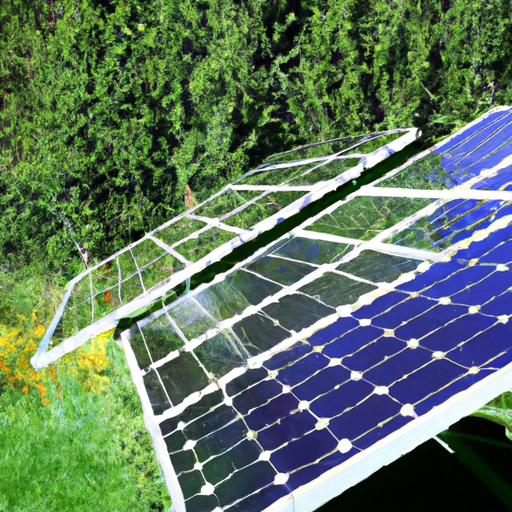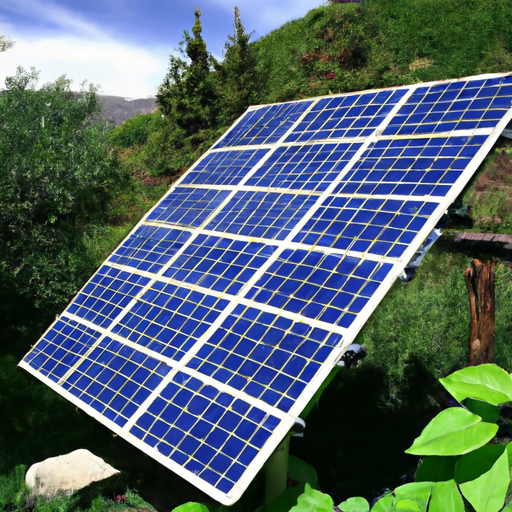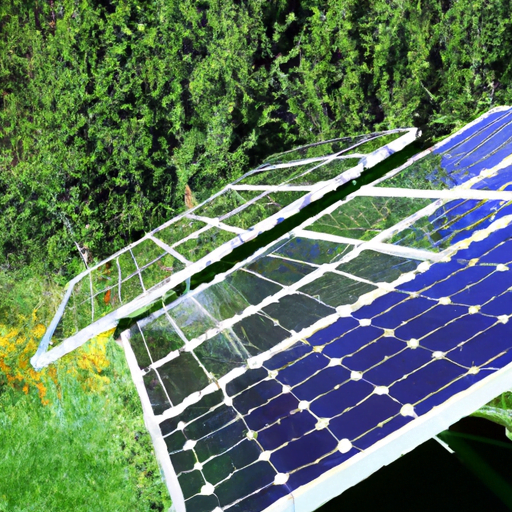Have you ever wondered what it would be like to live off the grid? You know, disconnecting from the traditional power grid and embracing a more sustainable lifestyle. It’s a popular trend nowadays, and for good reason. Living off the grid allows you to reduce your carbon footprint, save money on utility bills, and become more self-sufficient. If you’re curious about how to embrace off-grid living, you’ve come to the right place. In this article, we’ll explore the various aspects of living off the grid and provide you with some practical tips on how to make it a reality.
Living off the grid essentially means becoming energy-independent and relying on renewable sources for your electricity needs. This can be achieved through a combination of solar panels, wind turbines, and rainwater harvesting systems, among other sustainable practices. By doing so, you not only reduce your reliance on fossil fuels but also contribute to a greener and cleaner environment. But how does one actually live off the grid permanently? Well, it’s certainly not an overnight process. It requires careful planning, research, and a commitment to a more minimalistic and eco-friendly lifestyle.
In the upcoming article, we’ll delve deeper into the different aspects of off-grid living, such as finding the right location, understanding your energy needs, and implementing sustainable practices. We’ll also share some tips on how to make everyday tasks more energy-efficient and environmentally friendly. So, whether you’re interested in adopting a fully off-grid lifestyle or simply looking for ways to reduce your carbon footprint, stay tuned! You’ll learn everything you need to know to embrace off-grid living and embark on a more sustainable journey.

How to Embrace Off-Grid Living for a Sustainable Lifestyle
Living off the grid is becoming increasingly popular as individuals seek a more sustainable and self-sufficient lifestyle. By disconnecting from traditional utility systems and relying on renewable energy sources, off-grid living offers a unique opportunity to reduce environmental impact and live in harmony with nature. In this article, we will explore the various aspects of off-grid living, including its definition, benefits, challenges, and how to plan for and maintain this lifestyle.
Defining Off-Grid Living
Off-grid living refers to the lifestyle of living without reliance on public utilities such as electricity, water, and sewage systems. Instead, this lifestyle relies on self-sustainable systems for energy, water, and waste management. Off-grid living allows individuals to disconnect from the grid and live independently, reducing their ecological footprint and embracing a more sustainable way of life.
Benefits of Off-Grid Living
There are numerous benefits to embracing off-grid living. Firstly, it allows individuals to become more self-sufficient, reducing their dependency on external resources. By generating their own energy and managing their own water and waste systems, off-grid dwellers have greater control over their daily needs.
Secondly, off-grid living provides an opportunity to reduce environmental impact. By using renewable energy sources such as solar, wind, or hydro power, individuals can significantly reduce their carbon footprint and contribute to a cleaner and healthier planet.
Moreover, off-grid living often promotes a simpler and more peaceful lifestyle. Being disconnected from modern amenities can foster a sense of mindfulness and appreciation for the natural world. It can also provide a sense of freedom by allowing individuals to live in remote and beautiful locations.
Challenges of Off-Grid Living
While off-grid living has its many advantages, it also comes with its fair share of challenges. One of the main challenges is the initial cost of setting up off-grid systems. Solar panels, wind turbines, and other renewable energy equipment can be expensive to install, although the long-term savings can outweigh these costs.
Another challenge is the need for careful and efficient management of resources. Off-grid living requires individuals to be conscious of their energy usage and to find sustainable solutions for their everyday needs. This can involve careful planning and adaptation to ensure a comfortable and sustainable lifestyle.
Planning for an Off-Grid Lifestyle
Before embarking on an off-grid lifestyle, careful planning is essential. Here are some key considerations.
Assessing Your Energy Needs
To determine your energy requirements, you need to calculate the amount of electricity you consume on a daily basis. This includes the power needed for lighting, appliances, heating, and cooling. Once you have a clear understanding of your energy needs, you can explore renewable energy options such as solar power, wind power, or hydro power.
Choosing the Right Location
Selecting the right location is crucial for off-grid living. Consider factors such as access to sunlight for solar panels, wind patterns for wind turbines, and proximity to water sources. Additionally, make sure to research local zoning laws and building codes to ensure compliance and minimize potential setbacks.
Creating a Budget
Developing a budget will help you determine the cost of setting up and maintaining your off-grid systems. Consider the expenses of purchasing renewable energy equipment, building materials for your home, water storage and filtration systems, and any additional infrastructure needed.
Energy Solutions for Off-Grid Living
Once you have planned for your off-grid lifestyle, it’s time to explore energy solutions. Here are three common options for generating renewable energy off the grid.
Solar Power Systems
Solar power is one of the most popular and accessible sources of off-grid energy. By installing solar panels, you can harness the power of the sun to generate electricity. A solar power system typically includes solar panels, a battery bank for energy storage, and an inverter to convert DC (direct current) power to AC (alternating current) power.
Wind Power Systems
Wind power is another viable option for off-grid living, particularly in areas with consistent wind patterns. Wind turbines can generate electricity by capturing energy from the wind, which is then converted and stored in batteries for later use. Careful consideration of wind patterns and turbine placement is necessary to maximize energy production.
Hydro Power Systems
For individuals living near a reliable water source, hydro power systems can provide a consistent and renewable source of energy. By using a turbine, water flow can be harnessed to generate electricity. Small-scale hydro systems can be installed in streams or rivers, providing a continuous supply of power.
Water and Waste Management
Off-grid living also requires conscious management of water and waste. Consider the following solutions for sustainable water usage and waste disposal.
Collecting and Storing Rainwater
Rainwater harvesting is a sustainable method of water collection that can be adopted in off-grid living. By installing a rainwater collection system, you can capture and store rainwater for various household needs such as drinking, cleaning, and irrigating your garden. Proper filtration and storage systems are necessary to ensure the quality and safety of the collected water.
Implementing Greywater Systems
Greywater refers to gently used water from sources such as showers, sinks, and washing machines. By implementing greywater systems, you can recycle and reuse this water for irrigation and non-potable purposes. Greywater can be filtered and directed to gardens or constructed wetlands, reducing the strain on freshwater sources.
Composting Toilets
Composting toilets offer a sustainable alternative to traditional flush toilets. These systems use natural decomposition processes to convert human waste into compost, which can be safely used as fertilizer. Composting toilets reduce water consumption and contribute to nutrient-rich soil for gardening.
Growing Your Own Food
One of the core principles of off-grid living is self-sufficiency, and growing your own food is an integral part of that. Here are some considerations for establishing a sustainable garden.
Planning and Designing a Sustainable Garden
Plan your garden layout to maximize efficiency and productivity. Consider factors such as sunlight exposure, soil quality, and water availability. Use permaculture principles to create a self-sustaining and diverse ecosystem.
Choosing the Right Crops and Livestock
Select crops that are well-suited to your climate and soil conditions. Incorporate a variety of fruits, vegetables, and herbs to ensure a balanced and nutritious diet. If space allows, consider raising livestock such as chickens or goats to further enhance self-sufficiency.
Implementing Permaculture Practices
Permaculture is a design philosophy that promotes sustainable, resilient, and self-sufficient ecosystems. By implementing permaculture practices such as companion planting, soil regeneration, and water conservation techniques, you can create a productive and harmonious garden.
Building and Maintaining Off-Grid Homes
The construction and maintenance of off-grid homes require careful consideration of sustainable materials and design principles. Here are some key factors to consider.
Building with Sustainable Materials
When constructing your off-grid home, opt for sustainable materials that have minimal environmental impact. Consider materials such as reclaimed wood, bamboo, or recycled materials. Additionally, focus on energy-efficient insulation and natural cooling and heating systems to reduce energy consumption.
Passive Solar Design Considerations
Passive solar design utilizes the sun’s energy for heating and cooling purposes, reducing the need for artificial heating or cooling systems. Incorporate features such as orientation, insulation, and appropriate window placement to optimize natural lighting and passive heating.
Understanding Off-Grid Home Maintenance
Off-grid homes require regular maintenance to ensure optimal function and sustainability. Familiarize yourself with the various systems and equipment in your home, including renewable energy systems, water filtration systems, and composting toilets. Regular inspection and maintenance will help prevent potential issues and prolong the lifespan of your off-grid systems.
Self-Sufficiency and Sustainable Living
Embracing an off-grid lifestyle goes hand in hand with developing essential skills for self-sufficiency. Here are some areas to focus on.
Developing Essential Skills
Learn practical skills such as gardening, food preservation, carpentry, and basic construction. Developing these skills will enhance your self-sufficiency and reduce dependency on external resources.
Preserving and Storing Food
Preserving and storing food is essential for maintaining a sustainable lifestyle. Explore methods such as canning, dehydrating, fermenting, and root cellaring to extend the shelf life of your harvests and reduce food waste.
Reducing Waste and Consumption
Off-grid living encourages a “less is more” mentality. Minimize waste by practicing recycling, composting, and repurposing. Embrace conscious consumption by opting for sustainable and durable products, reducing single-use items, and supporting local businesses.
Health and Wellness in Off-Grid Living
Off-grid living can also have positive impacts on health and wellness. Consider the following aspects.
Alternative Health Solutions
Living off the grid often encourages a holistic approach to health and wellness. Explore alternative health practices such as herbal medicine, acupuncture, meditation, and yoga to support your physical and mental well-being.
Creating a Balanced Lifestyle
Connect with nature and prioritize self-care. Engage in outdoor activities, spend time in natural settings, and cultivate a healthy work-life balance. Embrace simplicity and mindfulness in your daily routines.
Connecting with Nature
Living off the grid provides abundant opportunities to connect with nature. Take advantage of your surroundings by exploring hiking trails, swimming in nearby lakes or rivers, and observing the local flora and fauna. Immersing yourself in nature can provide a sense of peace and fulfillment.
Embracing Community and Collaboration
Off-grid living does not necessarily mean living in isolation. Consider these aspects to embrace community and collaboration.
Forming Off-Grid Communities
Joining or forming off-grid communities allows individuals to live in close-knit communities that share resources and support each other’s self-sufficiency efforts. Shared knowledge, skills, and collaborative projects can enhance the off-grid experience.
Collaborative Resource Sharing
Pooling resources with like-minded individuals can offer financial and logistical benefits. Shared tool libraries, communal gardens, and collective energy projects can make off-grid living more affordable and efficient.
Supporting Local Economies
Participate in local markets, businesses, and community initiatives to support the local economy. Engaging with nearby communities fosters a sense of belonging and strengthens the resilience of the entire region.

Conclusion
Off-grid living offers a unique way to embrace sustainability, self-sufficiency, and a deeper connection with nature. By carefully planning and implementing renewable energy systems, sustainable water and waste management solutions, and food production methods, individuals can create a fulfilling and sustainable off-grid lifestyle. By nurturing essential skills, fostering health and wellness, and embracing community and collaboration, off-grid living can lead to a more resilient and sustainable future. So, are you ready to embrace off-grid living and embark on a sustainable lifestyle? The choice is yours.




